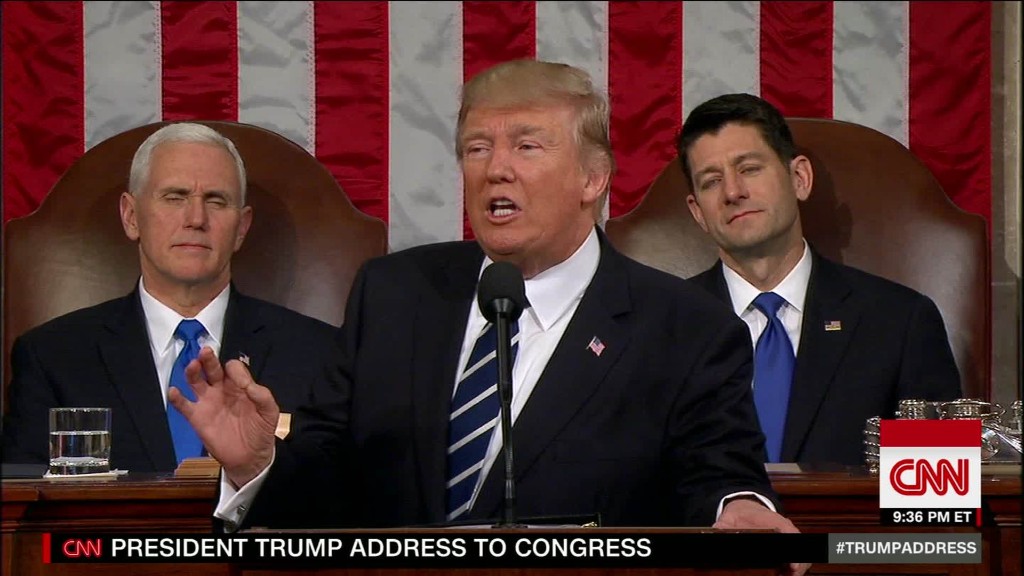
President Trump didn't mention the words "trade war" in first big speech to Congress Tuesday. But he came pretty close to calling for one.
Trump used the speech to paint a dire portrait of the economy: 43 million Americans live in poverty (true), nearly one in five people in their prime working years don't have a job (true) and the recent recovery was the weakest in 65 years (true, at least by one metric).
The problem according to Trump? Trade.
"I am not going to let America and its great companies and workers, be taken advantage of anymore," Trump declared.
While Trump softened his tone overall Tuesday, his "America first" rhetoric on trade still came through clearly. It alarms many CEOs, economists and investors.
"My job is not to represent the world. My job is to represent the United States of America," he said in perhaps his boldest statement yet of the Trump doctrine that governs foreign policy and trade.
"He's making it very clear that everything he promised on the economic front he intends to deliver on," said economist Ed Yardeni of Yardeni Research.
Related: Gutting the EPA won't address debt
The trade deficit
Trump zeroed in on the U.S. trade deficit during his address, saying that the imbalance in goods was nearly $800 billion last year. (In fact, when services are included, the deficit is roughly $500 billion).
The president promised to level the playing field -- a favorite campaign theme.
To illustrate his point, Trump related a story involving the iconic American motorcycle maker Harley-Davidson (HOG). When company executives recently visited the White House, Trump said he had asked them about their biggest business problem. They pointed to hefty taxes on motorcycles sold abroad.
"They said that in one case another country taxed their motorcycles at 100%," Trump explained. "They weren't even asking for change. But I am."
The president offered few new details. He didn't mention major tariffs on imports or the so-called boarder-adjustment tax, which is supposed to encourage companies to make goods in the U.S.
But he did use the speech to say new American pipelines must be made with American steel and that he intends to make it much harder for companies to leave the U.S. He even quoted President Abraham Lincoln on why it's right to have "protective policy."
The big takeaway is that Trump continues to signal that substantial action on trade is coming. He's embarking on these policies at a time when the vast majority of economists surveyed by CNNMoney see Trump's protectionist trade agenda as the No. 1 threat to a thriving U.S. economy.
"The risk of any protectionist moves by the U.S. will be to trigger retaliatory measures by other nations and end up by reducing trade and growth for all," said economist Lynn Reaser of Point Loma Nazarene University.
Related: Trump's child care plan is a gift to the rich, report says
Trump holdup on China
While experts warn against Trump taking actions that might trigger a trade war, the president's supporters want him to act.
In states like Michigan (which Trump won by just 10,704 votes), many of his supporters hate the North American Free Trade Agreement (NAFTA). They blame the trade deal -- not automation and technology -- for heavy manufacturing job losses in the state.
"People talk about you're going to start a trade war, but we're in trade war now," said Bryan DeHenau, a Trump voter in Michigan who runs a small roofing business. "It's just we're not fighting it."
Sharp differences between the desires of Trump voters and the recommendations of CEOs and economists are likely to persist.
Bernard Baumohl, chief economist at The Economic Outlook Group, said that "cracks in the Trump agenda are becoming more visible." Investors, he said, should be waking up to this fact.
But Yardeni isn't as concerned. He points out that Trump originally promised to label China a currency manipulator on Day One.
That didn't happen. Instead, his point man on the China currency issue, Treasury Secretary Steven Mnuchin, has taken a much more cautious stance on it.


